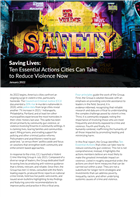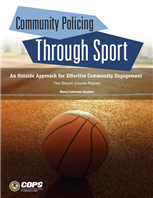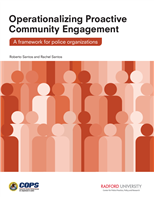Technology and Social Media - IACP Resources
This section examines law enforcement technologies such as body worn cameras, unmanned aircrafts, and less lethal weapons as well as the topic of social media. While these technologies cover a broad range of products and uses, many of the considerations for law enforcement agencies are similar.
The Law and Your Community
The Law & Your Community is a nationally recognized hands-on interactive training program by the National Organization of Black Law Enforcement Executives. This training program for young people ages 13-18, is designed to improve their communications with law enforcement officers and their understanding of their federal, state and local laws.
The Role of the Modern Prosecutor: Spearheading Innovation
This report was prepared by the Prosecutors’ Center for Excellence (PCE), and is an update of a 2016 paper written by PCE entitled, “The Evolving Role of the Prosecutor: Seeking Justice Through Community Partnerships and Innovation”.
DICE: Data-Informed Community Engagement
Violence Reduction Project: Essay on a data informed approach to crime prevention.
Violence Reduction Project Essays
Violence Reduction Project: A collection of essays from people with first-hand experience on violence reduction.
Law Enforcement Solutions By the Field, For the Field: Collaborative Reform Third Annual Review
The Collaborative Reform Initiative Technical Assistance Center is a partnership between the COPS Office and many professional law enforcement organizations throughout the field to provide technical assistance to law enforcement agencies on request. In its first three years, the center fielded more than 450 requests for assistance from campus, local, county, and state agencies on critical issues like community engagement; active shooter response; de-escalation; crime analysis; mass demonstrations; school safety; and recruitment, hiring, and retention. This report shows how the center has supported agencies in their efforts to ensure public safety in their communities. The COPS Office is committed to continue working diligently with our partners to provide high-quality, relevant, and timely assistance by the field, for the field.
Community Violence Intervention (CVI) Webinar Series: Place-based Approaches to CVI
This webinar, Part 2 of the Community Violence Intervention (CVI) Webinar Series, focuses on place-based approaches to CVI. The webinar includes presentations from and discussions among experts on how place-based approaches can reduce and prevent community violence and crime by enhancing and maintaining the physical characteristics of settings where people come together in order to foster social interaction, strengthen connectedness, and increase collective efficacy (e.g., shared trust among residents and willingness to intervene). Presenters highlight the importance of community engagement within place-based approaches and discuss how incorporating community revitalization efforts, such as increasing green spaces and addressing abandoned buildings can reduce and prevent community violence. The presentation also includes a discussion on the Biden Administration’s investments in CVI. Please note that parts of the presentation include an image and discussion that may be sensitive to some viewers. Please proceed with caution.
Council on Criminal Justice: Law Enforcement Based Responses to Violence
At two meetings in October, a working group highlights the promise and challenges of key law enforcement violence reduction strategies, and provides guidance to help leaders deploy programs appropriately.
Urban safety, community healing & gun violence reduction: the advance peace model
Cities around the world continue to grapple with safety, security and the role for law enforcement in reducing gun crime. Recent calls for alternatives to militarized policing in cities and addressing racism in urban crime policies and practices gives new urgency to explore community-led strategies. Advance Peace is a program that aims to reduce urban gun violence using formerly incarcerated community members as street outreach mentors and violence interrupters. Yet, few urban policy makers know of Advance Peace and how it is distinct from other community-based urban gun violence interruption programs, often called focused deterrence. In this paper, we describe the innovative approach used by Advance Peace, what distinguishes it from other municipal gun violence reduction strategies, and examine the elements of its unique, public health informed program called the Peacemaker Fellowship®. The Peacemaker Fellowship enrolls the small number of the most violent and hard to reach members of a community at the center of gun violence in an intensive 18-month program of trauma-informed, healing-centered, anti-racist mentorship, education, social services, and life opportunities. We suggest that cities around the world seeking transformations in their approach to public safety, including addressing structural racism and centering community expertise, explore the unique features of the Advance Peace approach.
Newark Community Street Team Narrative Evaluation
The narrative evaluation research undertaken by the UCLA Social Justice Research Partnership team was designed to tell the story of an innovative, community-based approach to violence and its impact on public health, neighborhood well-being and violence prevention: the Newark Community Street Team. The first step in the process, a narrative evaluation, will document the origins and development of the Newark Community Street Team (NCST) model and its successful implementation. Along with this focus, the evaluation will also chart the evolution of NCST as it moved from a pilot project to a promising practice. Finally, this report will serve as the foundation for the next step of evaluation: systematically interpreting crime data that NCST has access to through its partnership with the Newark Police Department and the Safer Newark Council. Most significantly, this evaluation will assist in future efforts to replicate this model in other national settings, validating the Newark Community Street Team as a public health-community safety Best Practice.
Community Engagement Strategies for State, Local, Tribal, and Territorial Law Enforcement Unmanned Aircraft System Programs
The Police Executive Research Forum (PERF), with support from the U.S. Department of Justice (DOJ) Office of Community Oriented Policing Services (COPS Office) and in consultation with the State, Local, Tribal and Territorial (SLTT) Unmanned Aircraft Systems (UAS) Working Group,3 developed this guide to assist public safety agencies in building an outreach strategy for engaging the community when considering a UAS (drone) program. This guide serves as a companion piece to our earlier publication, Roadmap to Implementing an Effective Unmanned Aircraft System (UAS) Program, an eight-step guide to planning a drone program.
Law Enforcement Solutions By the Field, For the Field: Collaborative Reform Fourth Annual Review
The Collaborative Reform Initiative Technical Assistance Center is a partnership between the COPS Office and many professional law enforcement organizations throughout the field to provide technical assistance to law enforcement agencies on request. In its first four years, the center fielded close to 700 requests for assistance from campus, local, county, and state agencies on critical issues like community engagement; active shooter response; de-escalation; crime analysis; mass demonstrations; school safety; and recruitment, hiring, and retention. This report shows how the center has supported agencies in their efforts to ensure public safety in their communities. The COPS Office is committed to continue working diligently with our partners to provide high-quality, relevant, and timely assistance by the field, for the field.
Columbus (Ohio) Division of Police: Roadmap to Implementation
This report, Columbus (Ohio) Division of Police: Roadmap to Implementation, describes the technical assistance conducted and the recommendations made for reform of the CDP's structure, technology, training, and community engagement and lays out steps and a timeline for implementing those recommendations.
Saving Lives: Ten Essential Actions Cities Can Take to Reduce Violence Now
In this final report, the group identifies Ten Essential Actions that cities can take now to reduce community gun violence. This list is not comprehensive; instead, it highlights the actions members believe are most likely to make the greatest immediate impact on violence.
Community Policing Through Sport – An Outside Approach for Effective Community Engagement
This paper explores lessons learned through the experience, as well as outside research, to establish best practices for how such initiatives may be able to enhance existing community policing concepts. The findings indicate that elements of the Kids & Cops Dream Courts program can be applied to departmental initiatives in multiple ways and lessons learned from it can provide ready examples for departments interested in expanding community efforts.
Operationalizing Proactive Community Engagement: A Framework for Police Organizations
This guide is intended to present police leaders with a framework for institutionalizing community engagement strategies to improve their personnel’s willingness to increase proactive, positive interactions with the community.

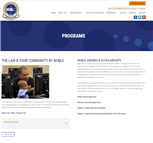
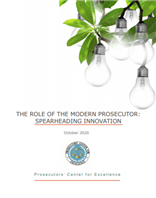


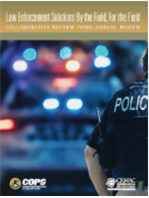



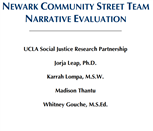
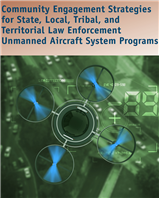
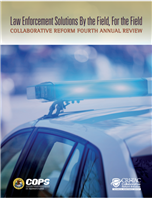
%20Division%20of%20Police%20Roadmap%20to%20Implementation_1x.png)
